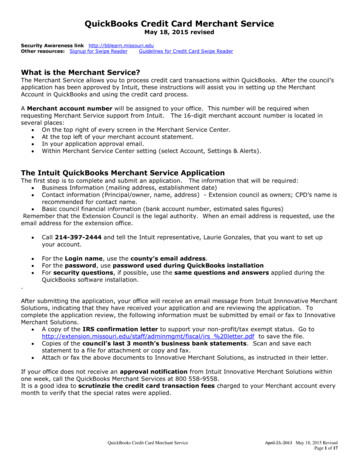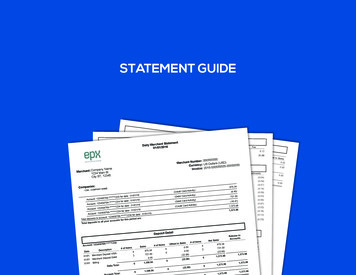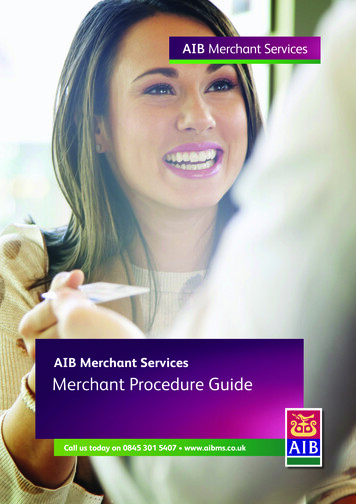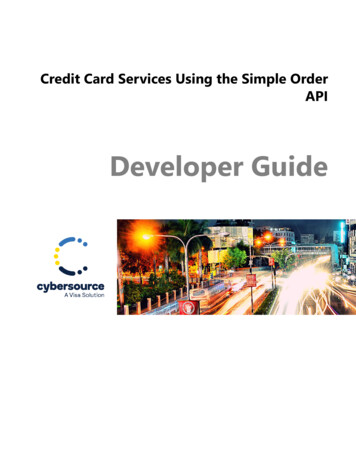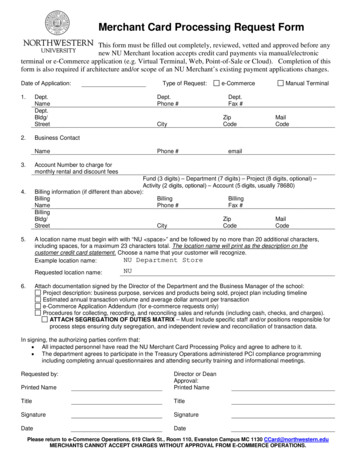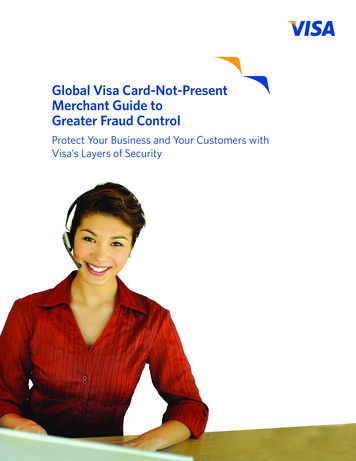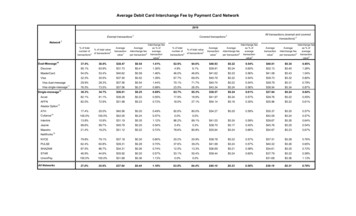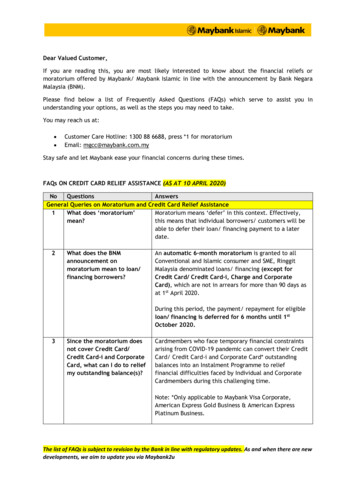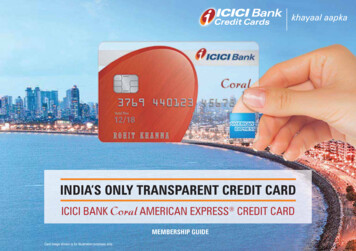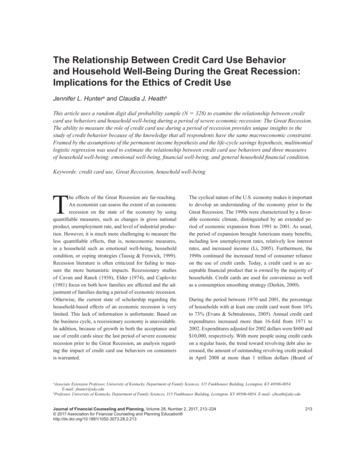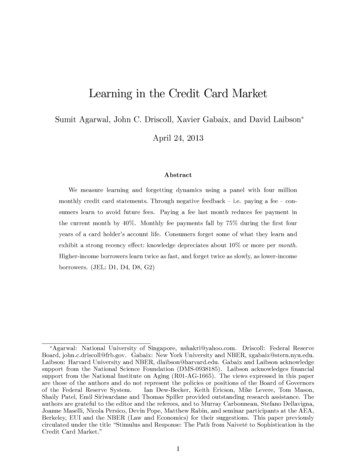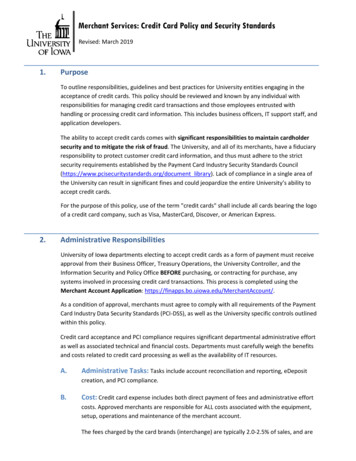
Transcription
Merchant Services: Credit Card Policy and Security StandardsRevised: March 20191.PurposeTo outline responsibilities, guidelines and best practices for University entities engaging in theacceptance of credit cards. This policy should be reviewed and known by any individual withresponsibilities for managing credit card transactions and those employees entrusted withhandling or processing credit card information. This includes business officers, IT support staff, andapplication developers.The ability to accept credit cards comes with significant responsibilities to maintain cardholdersecurity and to mitigate the risk of fraud. The University, and all of its merchants, have a fiduciaryresponsibility to protect customer credit card information, and thus must adhere to the strictsecurity requirements established by the Payment Card Industry Security Standards ent library). Lack of compliance in a single area ofthe University can result in significant fines and could jeopardize the entire University’s ability toaccept credit cards.For the purpose of this policy, use of the term "credit cards" shall include all cards bearing the logoof a credit card company, such as Visa, MasterCard, Discover, or American Express.2.Administrative ResponsibilitiesUniversity of Iowa departments electing to accept credit cards as a form of payment must receiveapproval from their Business Officer, Treasury Operations, the University Controller, and theInformation Security and Policy Office BEFORE purchasing, or contracting for purchase, anysystems involved in processing credit card transactions. This process is completed using theMerchant Account Application: https://finapps.bo.uiowa.edu/MerchantAccount/.As a condition of approval, merchants must agree to comply with all requirements of the PaymentCard Industry Data Security Standards (PCI-DSS), as well as the University specific controls outlinedwithin this policy.Credit card acceptance and PCI compliance requires significant departmental administrative effortas well as associated technical and financial costs. Departments must carefully weigh the benefitsand costs related to credit card processing as well as the availability of IT resources.A.Administrative Tasks: Tasks include account reconciliation and reporting, eDepositcreation, and PCI compliance.B.Cost: Credit card expense includes both direct payment of fees and administrative effortcosts. Approved merchants are responsible for ALL costs associated with the equipment,setup, operations and maintenance of the merchant account.The fees charged by the card brands (interchange) are typically 2.0-2.5% of sales, and are
Merchant Services: Credit Card Policy and Security StandardsRevised: March 2019calculated based on a variety of factors including the type of card presented by theconsumer.C.IT Resources: Determine access and availability of local IT support and resources to assistwith implementation, provide ongoing support of any Point of Sale (POS) systems or ecommerce sites, completion of PCI Matrix, as well as the required quarterly (if applicable)and annual PCI Compliance related tasks.3.Methods for Credit Card ProcessingThere are many different methods for processing credit card transactions. Due to PCI DSSrequirements there are methods that the University strongly encourages over others. Any solutionutilized must be validated and approved for use by the University’s centrally contracted credit cardprocessor. Methods that are validated and approved include:University's Credit ergeShopping Carts-Shopify-3D CartVirtual TerminalWeb based terminal formail or phone paymentsStand Alone TerminalConnected via-analog phone line-IP Ethernet ConnectionPoint of Sale System(POS)-Sequoia-BlackboardMobile Terminalconnected via CelluarNetworkForm Builders-WufooA.E-Commerce: Accepting credit card payments through a website requires the use of aGateway for payment authorization as well as specific website requirements.Website Requirements: E-Commerce sites must meet all requirements defined bythe University’s processor in order to complete merchant account onboarding. TreasuryOperations will provide the list of current requirements to the unit upon approval of theMerchant Account Application. The requirements must be met to ensure receipt ofrevenue. (See Appendix B)
Merchant Services: Credit Card Policy and Security StandardsRevised: March 2019Approved Gateways: These are credit card processing services that can be integratedwith web sites to collect payments.1.Converge is a gateway that is used with a website, where customers input theirpersonal credit card information. This method involves fees of 5/month and a 195 one-time setup fee. It is strictly used for transactions initiated on the Internet.This preferred method can be utilized in 2 ways:a) Fully outsourced ecommerce page using an iFrame or embedded link tothe Hosted Payment Page (HPP) from the ecommerce website andtransparently redirects the customer to the HPP provider’s website. This isthe preferred method of the University.b) University hosted website accepts or transmits the cardholder datadirectly and impacts the security of the payment.2.Authorize.net is a vendor gateway that is validated with the Payment ApplicationData Security Standards (PA DSS). It is a supported integration with the UI’s creditcard processor. Monthly gateway and per transaction fees B.Credit Card Terminal: This is a standalone machine, commonly associated with smallto medium size merchant accounts, where a card is present and is inserted or “swiped” totransmit data for authorization of the transaction amount, as well as occasional manualentry for Mail Order/Telephone Order (MOTO) transactions. This method requires aseparate, dedicated PHONE line for the transmission of data to the University’s credit cardprocessor. An IP connection method is available, with approval from local IT support staffand the Information Security and Policy Office. Cellular options are available for mobileneeds.1.VeriFone VX520 dial up or IP terminal purchase - 4952.Ingenico iWL250G Mobile Cellular terminal purchase - 749.00 19.00/monthwireless network feeC.Virtual Terminal: This is a web portal which functions similarly to a credit card terminal(see #2 listed above), however is accessible from any authorized university computer with aconnection to the Internet. This method is primarily used for MOTO transactions.D.Point of Sale System (POS): This is a system that combines cash register and creditcard acceptance functions to facilitate a check out process for in person transactions.Systems must be validated as compliant with the PA DSS. Systems must be approved duringthe University Purchasing/Contracting process or via the Technology Review Processdetailed below to ensure they will interface with the University’s credit card processor andare PCI Compliant.
Merchant Services: Credit Card Policy and Security StandardsRevised: March 2019Departments and units whose needs cannot be met through one of these approved methods mustprovide business justification for use of a third party product and obtain approval via theTechnology Review Process before acquiring an alternative system. A written agreementacknowledging the service provider’s responsibility for the security of cardholder data will berequired. Third party vendors must provide proof of PCI DSS/PA DSS compliance. A review must berequested using the Technology Review Process: orm.4.Merchant Account ResponsibilitiesA.Account Boarding: Upon approval of the Merchant Account Application, TreasuryOperations will request the new merchant account from the University’s credit cardprocessor. Merchants MAY NOT establish their own banking relationships for paymentcard processing. Revenue received from payment card sales must be deposited into adesignated University bank account. Treasury Operations negotiates all banking and cardprocessing relationships on behalf of the entire University, leveraging discounts based onlarger volumes and internal controls that are not available at the departmental level.Merchants will automatically be setup to accept Visa, MasterCard, Discover, and AmericanExpress.B.Training: All persons involved with the processing, accounting and reconciliation of creditcard transactions must ANNUALLY complete the following Self-Service ICON trainingcourses. (PCI 12.1.1) Units may work with their HR Unit Representative to assign thesecourses to all involved staff to ensure compliance is initially attained and annuallymaintained. (Self-Service- Personal- Learning and Development- My Training- Enroll inCourse):1. WCCARD - Credit Card Policy Training2. WSANS1 – UIOWA Security Awareness TrainingC.Reconciliation and Reporting1. eDeposits: Review eDeposit downloadable guides on how to post credit card salesand refunds to the General Ledger.2. Merchant Connect Reporting: Merchants must self-register at Merchant Connectto access monthly credit card processing statements & fees. Paper statements arenot mailed to merchants. Individuals will need specific information to register.Please contact treasury-creditcards@uiowa.edu for assistance.3. Monthly Reconciliation: Merchants must use all applicable reporting from themonthly credit card processing statements, eDeposits, POS systems, and daily batchreports to reconcile the GL on a monthly basis. https://afr.fo.uiowa.edu/policies-
Merchant Services: Credit Card Policy and Security StandardsRevised: March ns-and-accountsD.PCI Compliance RequirementsUniversity credit card merchants, with the assistance of their designated IT support staff, arerequired to use PCI Compliance Manager, a web-based compliance validation tool used by theUniversity to track merchant compliance with PCI DSS. PCI Compliance Manager is used by eachmerchant to complete an annual Self-Assessment Questionnaire (SAQ), set up external networkvulnerability scanning (if applicable), review compliance reports, and access other valuablecompliance tools.In addition to guidance and direction from Treasury Operations and the Information Security andPolicy Office, the University of Iowa PCI Steering Committee will provide PCI related institutionaloversight for all university merchants.1. Self-Assessment Questionnaire – New Merchants: There are eight differentversions of the SAQ; the appropriate version varies by merchant and is determinedby the method used to process credit card transactions. (See Appendix D forprocessing methods and associated SAQ required). Via a collaborative effortbetween the department business contact and their IT Support, the initial SAQ mustbe completed no later than 90 days after the onset of processing credit cards.Merchants that have not completed this process OR corrected problems resulting inthe non-compliant status within the allowed timeframe will be reported to thefollowing individuals with the recommendation that merchant card processingprivileges be terminated: University Chief Information Security Officer University Chief Financial Officer2. Annual renewal of SAQ – All Merchants: PCI-DSS Compliance is not a single event,but rather a joint, continuous, ongoing process between the merchant accountowner and their local IT support staff to:a) Ensure the SAQ completed is appropriate for the merchant’s method ofprocessing credit card transactions. (See Appendix D)b) Merchant accounts with a non-compliant SAQ and/or External VulnerabilityScan in PCI Compliance Manager, as well as systems not on the PCI network willbe given a reasonable amount of time, not to exceed 30 days, to resolve theissues that have caused the non-compliance. Non-compliant merchants beyondthe allowed timeframe will be reported to the following individuals with therecommendation that merchant card processing privileges be terminated: University Chief Information Security OfficerUniversity Chief Financial Officer
Merchant Services: Credit Card Policy and Security StandardsRevised: March 20193. Attestation of Compliance: At the end of each SAQ is the “Attestation ofCompliance”. Completion and retention of the Attestation self-certification providesdocumentation that the department has performed a PCI DSS self-assessment.4. PCI Matrix: All merchants are required to complete a PCI Matrix during themerchant account boarding process. The PCI Matrix provides a standard templatefor campus merchants to document, manage, and maintain a comprehensiveinventory of their PCI environment, including but not limited to, IT support staff,devices, and IP addresses of systems involved with credit card transactions. Thecompleted PCI Matrix is expected to provide merchant support relatedinformation to facilitate business continuity and guidance of PCI compliancerelated activities, including timely completion of the SAQ.5. PCI Network: All Merchants required to complete SAQ A EP, B IP, C or D musthave all applicable devices/applications/hosts, migrated, staged, and managed onthe University PCI compliant network. Host migration and maintenance can becoordinated by the local IT Support staff, through the Information Security andPolicy Office.6. External Vulnerability Scans: Merchants required to complete SAQ A EP, B IP, Cor D must also configure PCI Compliance Manager to perform quarterly externalvulnerability scans for all devices that are used to process, store or transmitcredit card data. These quarterly scans must commence no later than 90 daysafter the onset of processing credit cards. The merchant’s IT Support mustschedule, review, and attest the scans each quarter.7. PCI DSS Compliance Fees: 7/month charged directly to merchantE.Changes to an Established Merchant AccountAny changes to an established merchant account must be requested using the MerchantAccount Application: https://finapps.bo.uiowa.edu/MerchantAccount/.ALL merchant technology changes must be approved in advance, before purchase oruse.Examples of changes include:1. Termination of account2. Change of MFK for credit card revenue3. Change of MFK for credit card debits (fees, chargebacks)4. Change of merchant primary contact5. Change of technology used to process credit cards, such as:a) A new or different method of accepting cardsb) Purchasing new software or hardwarec) Selecting a new gateway service provider
Merchant Services: Credit Card Policy and Security StandardsRevised: March 2019F.Payment Card Industry Data Security StandardsThe Payment Card Industry Data Security Standards (PCI DSS) were originally developedthrough a collaborative effort by the major card brands, MasterCard, Visa and others, as aset of technical and operational security requirements to protect sensitive credit card data.Today these standards are set by the PCI Security Standards Council (PCI SSC) and enforcedby the payment card brands. These requirements MUST be followed by ALL entities thatprocess, store or transmit cardholder data. The PCI Data Security Standard identifiestwelve basic security requirements for cardholder transactions. (See Appendix C)University of Iowa merchants are EXPLICITLY PROHIBITED from storing sensitivecardholder data on any University systems, including University servers, both local andthose hosted off- site, workstations, and other locally maintained systems, includingdatabases, file servers, spreadsheets, email, imaging systems, and paper files. (PCI 3.2)Sensitive Cardholder Data includes:1. Full Credit Card/Personal Account Numbers (PAN)2. Security Codes (CAV2,CVC2, CVV2, CID)3. PIN/PIN blocks4. Full Magnetic Stripe Data or Chip Equivalent (most egregious violation of PCI DSS)Merchants using a shared mailbox used to communicate with customers must run Spirionscans monthly. Merchants should consult with their IT Support Consultant to provision andrun the periodic scans. https://its.uiowa.edu/support/article/2697NEVER e-mail or transmit sensitive cardholder data via unsecured messaging or transferprotocols/technologies. (PCI 4.2)ALL credit card documentation must be treated as a cash equivalent and should be keptphysically secured, such as in a locked safe or filing cabinet. (PCI 9.6)Any hand written credit card documentation no longer needed for business or legal reasonsmust be destroyed via an acceptable destruction method, including cross-cut shredding,incineration, or placement in a locked “to-be-shredded” container, like those serviced byoutside third-party document destruction companies. (PCI 9.8)Should a merchant experience a security breach, the University’s credit card processor isauthorized on behalf of the card brands to assess the merchant any fine levied by the cardassociations as well as the costs of forensic investigation, remediation, customernotification and re-issuance of cards.A single merchant breach may result in the elevation of the merchant, or potentially all UI
Merchant Services: Credit Card Policy and Security StandardsRevised: March 2019merchants’ status to Level 1 at the discretion of the UI contracted bank. Level 1 statusrequires the merchant to fund and submit to a third-party audit of the credit cardprocessing environment by a Qualified Security Assessor (QSA). It should be noted that theUniversity will not reimburse or share the cost of any expenses arising from the unintendedexposure of cardholder data; expenses will be the responsibility of the breached merchant(UI department/unit).Merchants must immediately report suspected or confirmed security breaches to itsecurity@uiowa.edu or call 319-335-6332, as outlined by the following University policies:(PCI 12.10)1. Policy IT-06: IT Security Incident incident-escalation2. Policy IT-23: Computer Security Breach Notification y-breach-notification-policy5.Important Links for MerchantsTreasury Operations - sourcesPCI Compliance Manager – https://pcicompliancemanager.com (Login Required)Merchant Connect – https://www.merchantconnect.com (Login Required)PCI Security Standards – http://www.pcisecuritystandards.orgPreparing Credit Card eDeposits – ction helpUI Cash Handling Desktop Procedures - ng-depositspolicies- and-proceduresIT Security & Policy Office (PCI Matrix & FAQs) - handlingpci-dss-standards-compliance
Merchant Services: Credit Card Policy and Security StandardsRevised: March 2019APPENDIX A: BEST PRACTICESTo qualify for the best possible rate:1. Ensure the settlement process is performed at the end of business each day (aka “BatchingOut”). Note that some terminals and most software can be configured to perform this taskautomatically at a predetermined time of day. Settlement outside of the required time periodmay cause the transaction to be “downgraded” (meaning it does not qualify for a preferredrate because it is perceived as an increased risk).2. Perform/require address verification for each transaction (aka “AVS”). AVS verifies the numericportions of a cardholder’s billing address. For example, if your customer provides an address of1847 Hawkeye Drive, Iowa City, IA 52242, AVS will confirm with the credit card company thenumbers 1847 and 52242. If the information does not match, it may cause the transaction to bedowngraded or even declined.3. Whenever possible, process card present transactions by swiping the actual credit card ratherthan keying manually.
Merchant Services: Credit Card Policy and Security StandardsRevised: March 2019APPENDIX B: WEBSITE REQUIREMENTSMerchant guide to all elements that must be pr
Merchant Services: Credit Card Policy and Security Standards Revised: March 2019 Approved Gateways: These are credit card processing services that can be integrated with web sites to collect payments. 1. Converge. is a gateway that is used with a website, where customers input their personal credit card information.
